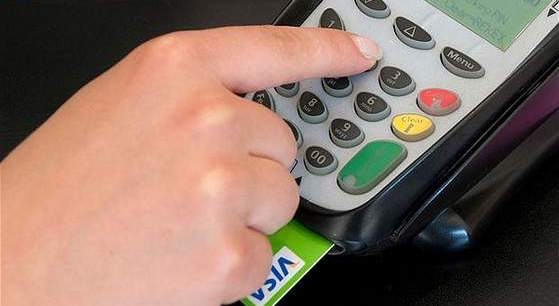
In 2015 retailers across the United States will be upgrading checkout technology to accommodate new payment cards. The new cards, with ‘chip and pin’ technology, are not swiped through a checkout machine. Instead they are inserted into point of sale devices and held there during the transaction. Customers must also use a PIN — personal identification number — during the transaction. The upgrade is an opportunity for retailers across the country to eliminate an access barrier that has plagued blind shoppers for a decade: flat screen machines that don’t allow customers to independently enter their PIN if they can’t see the screen.
The upgraded cards are designed to increase security and prevent fraud. But there is no security at all if a shopper has to divulge her PIN to a store clerk to complete a purchase. To avoid blind people being forced to share confidential information, devices that accept the new chip and PIN must have tactile keypads that can be felt. A raised dot on the five key, a standard telephone keypad arrangement, and raised symbols on the function keys will enable blind shoppers to privately and independently enter their PIN on the device.
Read more about the new Chip and Pin cards.
The ADA Requires POS Devices with Real Keypads people can Feel
Retailers that are not currently providing devices with tactile keys are already violating the ADA and disability rights laws in various states. The United States Department of Justice has recognized that retailers who offer only flat screen point of sale devices run afoul the Americans with Disabilities Act. In April 2014 it filed a “Statement of Interest” in a lawsuit filed by a blind customer of a Lucky Brand Jeans Store in Florida. The Department wrote that the blind customer stated a claim under the ADA even though the statute or regulations don’t specifically mention point of sale devices or tactile keypads:
The absence of specific technical standards or regulatory provisions that directly address a public accommodation’s obligation to provide accessible POS devices in no way establishes that the accessibility of POS devices is outside the scope of title III, especially where current regulations incorporate specific obligations for effective communication. DOJ Statement of Interest
The Department explained that the ADA covers many things not mentioned by name:
Indeed, there are many instances where the Department has found physical and communication barriers not specifically identified in its regulation or the ADA Standards to be covered under title III. For example, the Department has long considered websites to be covered by title III despite the fact that there are no specific technical requirements for websites currently in the regulation or ADA Standards. DOJ Statement of Interest
Read the Full Statement of Interest Filed by the Department of Justice in the Lucky Jeans POS case.
Kudos to National Retailers who have Worked with the Blind Community on POS Devices
Many national retailers have participated in Structured Negotiations on the issue of point of sale devices and the need for tactile keypads. Structured Negotiations is a collaborative dispute resolution process that operates outside the litigation system. Target, CVS, Walmart and Staples are among the companies that worked with the American Council of the Blind, its California affiliate, and the American Foundation of the Blind in Structured Negotiations about their POS devices. These companies recognized the importance of checkout technology that everyone can use.
- Read press releases announcing tactile point of sale initiatives
- Read summaries of the point of sale settlement agreements with links to the full documents
It is important to remember that tactile keypads do not make a device fully accessible to blind customers. Machines won’t be accessible until all features and functions can be performed independently, and because of this, staff training is critical. But confidentially entering the PIN is important not just for access, but for financial privacy, confidentiality and security. Let 2015 be the year when flat screen devices are once and for all removed from the retail landscape.